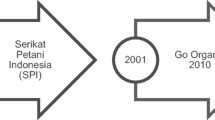Abstract
A conceptual framework influenced bythe concept of moral ecology is developed andused to analyze the transition fromtechnological (green revolution) to ecological(organic) rice farming by resource poor farmersfrom the Philippine island of Bohol. This MoralEcology Framework (MEF) focuses on theepistemology of the two farming systems and howthis influences management principles andpractice. The orienting concepts of systemic understanding, exchange betweensociety and the environment, local versusextra-local exchange and scope areintegral to this analysis. The case studydemonstrates how the ostracism of nature underthe green revolution coupled with itsinflexible production options affected thesustainability of some local rice farmingsystems. Whereas the transition to organicfarming and the concomitant incorporation ofecological processes and more flexibleproduction options has allowed local farmers toenhance the sustainability of their farmingsystems by altering the exchange processeswithin the socio-ecological system.
Similar content being viewed by others
References
Altieri, M. (ed.) (1987). Agroecology. Boulder, Colorado: Westview Press.
Bertuso, A. R. (2000). Farmer's Management of Rice Genetic Diversity: A Study on Enhancing Red Rices in Bohol, Philippines, Unpublished Masters Thesis, Wageningen University, The Netherlands.
Carroll, C. R., J. H. Vandermeer, and P. M. Rosset (1990). Agroecology. New York: McGraw-Hill.
Dove, M. R. and D. M. Kammen (1997). “The epistemology of sustainable resource use: Managing forest products, swiddens and high yielding variety crops.” Human Organisation 56(1): 91–101.
Gleissman, S. (1998). Agroecology. Chelsea, Michigan: Sleeping Bear Press.
Jordan, C. F. (1998). Working with Nature. Amsterdam: Harwood Academic Publishers.
Kirchmann, H. and G. Thorvaldsson (2000). “Challenging targets for future agriculture.” European Journal of Agronomy 12(3-4): 145–161.
Koepf, H. H., B. Patterson, and W. Schaumann (1976). Biodynamic Agriculture: An Introduction. New York: Anthroscopic Press.
May, T. (1997). Social Research: Issues, Methods and Process. Buckingham, UK: Open University Press.
Norgaard, R. B. and T. Sikor (1987). “The methodology and practice of agroecology.” In M. Altieri (ed.), Agroecology. Boulder, Colorado: Westview Press.
Pretty, J. N. (1995). Regenerating Agriculture. London: Earthscan.
Rigby, D. and D. Caceres (2001). “Organic farming and the sustainability of agricultural systems.” Agricultural Systems 68: 21–40.
Savory, A. (1988). Holistic Resource Management. Washington, DC: Island Press.
Scott, J. C. (1976). The Moral Economy of the Peasant. New Haven, Connecticut / London: Yale University Press.
Shiva, V. (1988). “Reductionist science as epistemological violence.” In A. Nandy (ed.), Science, Hegemony and Violence: A Requiem for Modernity. New York: Oxford University Press.
Smil, V. (1994). “How many people can the world feed.” Population and Development Review 20(2): 255–292.
Stevens, R. D. and C. L. Jabara (1988). Agricultural Development Principles. Baltimore: Johns Hopkins Press.
Swaminathan, M. S. (2000). “Walking the Tightrope.” In H. Cadman (ed.), The Food and Environment Tightrope. Canberra: Australian Centre for International Research.
Wolf, R. (1977). Organic Farming. Emmas, Pennsylvania: Rodale Press.
Yapa, L. (1993). “What are improved aeeds? An epistemology of the green revolution.” Economic Geography 69(3): 254–273.
Author information
Authors and Affiliations
Corresponding author
Rights and permissions
About this article
Cite this article
Carpenter, D. An investigation into the transition from technological to ecological rice farming among resource poor farmers from the Philippine island of Bohol. Agriculture and Human Values 20, 165–176 (2003). https://doi.org/10.1023/A:1024013509602
Issue Date:
DOI: https://doi.org/10.1023/A:1024013509602



